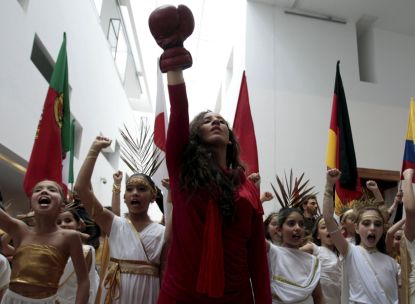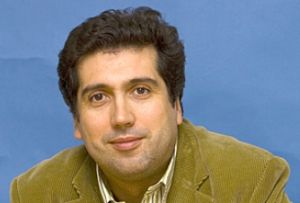
Tunisian children participate in the
reopening of the Bardo Museum
after a terror attack targeting one of the Arab world’s most successful
democracies killed 21 people, mostly European tourists.
Evidence that
Muslims are Indeed Capable of Democracy (Diário de Notícias, Portugal)
“The
democratic experience of the Arab world remains a fragile one. … Nevertheless,
the Arab world and the Islamic world are not synonymous. … It is not hard to
find examples of democracy in Islamic countries. Turkey is the most obvious,
even if it didn’t make the demanding Index of 24 countries listed by The
Economist as full democracies. Indonesia, Malaysia and Senegal are also the
scenes of competition between parties and pluralism in the media – two
indicators of democracy. What to say about Pakistan, despite having half of its
history marked by generals as presidents? It’s not a lack of parties or an
absence of an alternating government that so bedevil the country, which is also
a reminder that democracy is never perfect.”
By Leonídio Paulo Ferreira

Translated By Brandi Miller
March 26, 2015
Portugal – Diário
de Notícias – Original Article (Portuguese)
On the promise of the Arab Spring, listen to a man born
during the First World War: “We have a much better chance of establishing
– I hesitate to use the word democracy – but some sort of open, tolerant
society, if it’s done within their systems, according to their
traditions.” British scholar Bernard Lewis, nearly a century old, is one
of the most famous Islamologists. Four years ago that
was his response to The Wall Street
Journal when the fall of dictators in Tunisia and Egypt led us to
believe that a wave of democracy was rippling through the Arab world. Lewis’
caution is understandable today, especially a week after Tunisia
suffered an attack designed to undermine the most successful of the Arab
Spring countries – perhaps not by chance where it all began.
“These terrorists in Tunisia were targeting
democracy,” denounced Lina
Ben Mhenni in the Guardian.
In 2011 she became famous as the Tunisian Girl: an account of how an Arab
blogger helped in the fall of Ben Ali.
Mubarak was deposed and arrested shortly after Ben Ali went
into exile in Saudi Arabia. There were free elections and an old Mubarak
opponent, Mohamed Morsi of the Muslim Brotherhood,
won. However, the military showed who in Egypt was really in charge and deposed
the first civilian president in the history of the country. The strongman of
the armed forces, General Sissi, then took off his
uniform and was elected. That is how the Arab Spring was synthesized in Egypt,
where the absence of tourists left the economy in tatters – a crisis eased only
by the injection of Saudi and Kuwaiti capital.
After months of a civil war thrown out of balance by a
U.N.-approved bombardment, the forces faithful to Mohammar Qaddafi were
defeated in Libya with the dictator, in power since 1967, killed. If it quickly
became apparent that some of the rebels hesitated between banditry and
al-Qaeda, the victory of liberals in the first elections brought hope. Today,
though, there are two governments, everyone seems to be fighting everybody
else, and a branch of Islamic State is persecuting Christians. A sad synthesis
of the Arab Spring in a Libya with a sparse population and such an abundance of
oil wells that it should be an oasis.
A year after the start of the Arab Spring, Ali Abdullah Saleh negotiated his departure from Yemen. Before that
he was injured in an attack. His deputy succeeded him in February 2012 and was
elected president with promises of democracy, but with the country divided
between tribes and al-Qaeda cells, a Shiite rebellion took power and is now
under attack by Islamic State bombs – another bleak synthesis.
That’s to say nothing of Bahrain, where a popular revolt
against the king was framed by an old rivalry between Shiites and Sunnis and,
facing the threat of Iranian influence, Saudi Arabia quickly sent troops. Nor
will we return to the much-discussed issue of Syria, where an uprising against
Assad transformed into a jihadi revolution that the regime has successfully
confronted for the past four years, particularly since the world has realized
that a secular Arab dictator might be the lesser evil in comparison to the
Islamic State.
Let’s look at how even someone like Tahar
ben Jelloun, the Moroccan author of The Spark – Revolt in the Arab Countries
[L’Étincelle – Révolte dans
les pays arabes], allowed himself
to get carried away with enthusiasm over the Arab Spring:
“The liberating violence of the riots will not be
halted by repression. It is vibrant and creative. It embodies a new generation
of young people, some of whom have lived abroad and who, unlike their parents,
have opened up windows facing the world. They saw how other young people live
and have proven that freedom is synonymous with life. As in a dream, they
suddenly glimpsed that they, too, have a chance to live better, of ending
dictatorships, of regaining their dignity.”
Utopias aside, Tunisia will succeed. Habib
Bourguiba, the father of Tunisian independence, made Tunisia a
modern state. He gave rights to women and opened the country. Tunisians learned
in school that if their society is Muslim, it had older roots, whether Carthage
or Rome which defeated it. It is inspiring that so many people took to the
streets of Tunis after the attack on the Bardo Museum, even if at the
same time they were frightened that thousands of Tunisians have joined the
Islamic State.
The democratic experience of the Arab world remains a
fragile one. Morocco is on the right path and already had a socialist prime
minister. But the king’s role means it is a neutered form of democracy. In
Lebanon the situation is different: political pluralism must coexist with a
constitution that reserves the presidency to a Christian and the government to
a Sunni. As for Algeria, parties exist, elections are held, but generals give
the orders.
Nevertheless, the Arab world and the Islamic world are not
synonymous, and this is the mistake of those with elaborate theories about the
incompatibility of Islam with democracy and who sometimes raise the issue of
the Hijri year, a calendar that begins in 622AD, to
argue that Muslims live in the Middle Ages and therefore never experienced the
equivalent of the Renaissance or the Enlightenment.
It is not hard to find examples of democracy in Islamic
countries. Turkey is the most obvious, even if it didn’t make the demanding
Index of 24 countries listed by The Economist as full democracies.
Indonesia, Malaysia and Senegal are also the scenes of competition between
parties and pluralism in the media – two indicators of democracy. What to say
about Pakistan, despite having half of its history marked by generals as
presidents? It’s not a lack of parties or an absence of an alternating
government that so bedevil the country, which is also a reminder that democracy
is never perfect. A Pakistani newspaper, Dawn,
dedicated an editorial to Tunisia after secular Beji
Caid Essebsi was elected: Tunisia’s
Example was the title.
May the Tunisians, secular and Islamic parties alike such as those from the Ennahda Movement [aka/Renaissance
Party], continue to believe that democracy can be Arab – and for
them to surprise Lewis, aged 98.
SEE ALSO ON THE ARAB SPRING:
Folha, Brazil: Disproportionate Anti-U.S. Reaction Threatens the Arab Spring
Al Watan, Libya: If the Prophet Can be Insulted, then Holocaust can be Questioned
Le Quotidien d’Oran, Algeria: Why Insulting the Prophet Always ‘Pays Off Big’
Der Spiegel, Germany: Muslim Protests Show
Limits of Free Speech
Frankfurter Rundschau, Germany: Islam in Turmoil: Religion as ‘Ersatz-Identity’
Al Watan, Libya: Libyan Fatwa Court Calls Attack on Americans an ‘Offense to Islam’
The Independent, U.K.: Obama’s Foreign Policy of Reconciliation Lies in ‘Tatters’
Die Zeit, Germany: Romney’s ‘Nostalgia’ Ill-Suited to Reality of Fast-Changing World
Die Tageszeitung, Germany: Muslim Unrest Raises Stakes of U.S. Election Even Higher
Independent, U.K.: ‘Inside Story’ of U.S.
Envoy’s Assassination
Global Times, China: America is ‘Disrespectful’ of Other Cultures
Daily Star, Lebanon: Influential Lebanon MP
Says Israel Backed
Film to Defeat Obama
Debka File, Israel: Al-Qaeda Chief Zawahri
‘Personally Ordered’ Murder
of U.S. Envoy
Independent, U.K.: ‘Provocateurs’ East and West Know: Politics and Religion Don’t Mix ’
Telegraph, U.K.: Arab Spring Turns Sour for United States
Telegraph, U.K.: Ambassador Chris
Stevens: Man of Drive, Passion
Independent, U.K.:
Fear and Loathing:
Another Unholy Row about Islam
Guardian, U.K.:
Attack in Libya Underlines
Threat of Salafi Islamists
Global Times, China: America ‘Disqualified’ as Global Human Rights Judge
Xinhua, China: Human Rights Record of the United States in 2011
Rodong Sinmun, North Korea: America by Far World’s Leading Human Rights Abuser
Yezhednevniy Zhurnal, Russia: Putin is Mistaken to Favor China Over the United States
Huanqiu, China: U.S. Should Keep its Nuclear Weapons Away from Koreas
Guardian, U.K.: It Should
Have Been Clear – Deposing
Qaddafi was the Easy Part
CLICK HERE FOR
PORTUGUSE VERSION
Please enable JavaScript to view the comments powered by Disqus.
blog comments powered by Disqus
[Posted By Worldmeets.US, March 26, 2015, 6:15pm]
Source Article from http://worldmeets.us/diariodenoticias000017.shtml


Comments